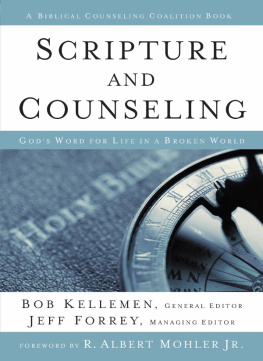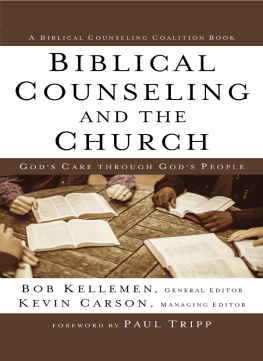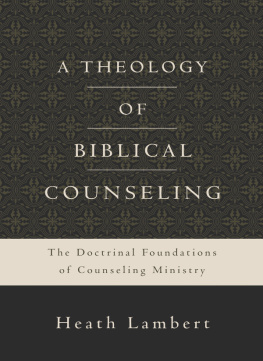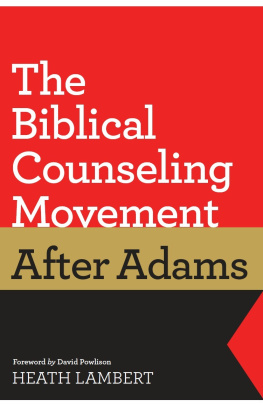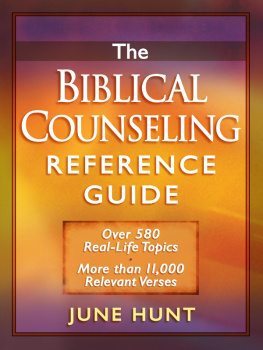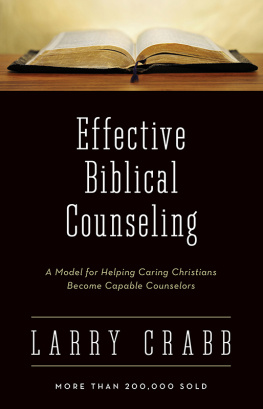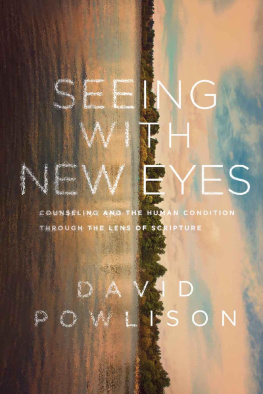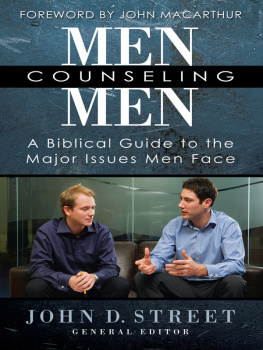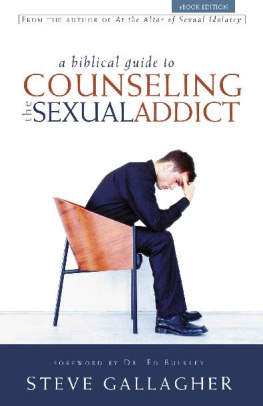This book is written to present a system of biblical truth that brings together people, their problems, and the living God. Counseling is based on the convictions that (1) Gods Word should be our counseling authority, (2) counseling is a part of the basic discipling ministry of the local church, and (3) Gods people can and should be trained to counsel effectively.
Counseling is written for all of Gods people: pastors, elders, and laypeople. We foresee the book as a potential textbook in biblical counseling or pastoral theology at the Christian college and seminary levels. Veteran pastors with a great deal of training and experience and pastors without seminary training or much practical experience can all profit from this volume. Sincere laypeople who want to improve their skills in serving Christ and His people will also find many useful, practical, and stimulating insights in this publication.
In preparing this book, we have labored to present material that is accurately biblical rather than humanistic or secular, basically proactive rather than reactive or polemic, practical rather than theoretical and abstract, and easily understood rather than technical or complicated. We have written to inform, to excite, to instruct, to confirm, to enlarge, and to promote spiritual and ministerial growth in the readers.
This book has been written with eleven objectives in mind:
1. To enlarge and reinforce the confidence of Gods people in the sufficiency, superiority, and practicality of Scripture for dealing with all of the issues of life, and to convince Christians that the resources we have in Christ and His Word are not only sufficient for handling and solving all of the personal and interpersonal problems of life but are superior to the resources that are found in the world; that is, to answer the questions, Do we need more than what the Scriptures offer to be effective in our counseling ministries? What do the Scriptures say about counseling? What is the biblical basis for using Scriptures in counseling?
2. To encourage Christians to think biblically about all counseling-related issues; that is, to answer the question, What does it mean to think biblically, and how can we develop a biblical mind-set or consistently biblical worldview?
3. To help Christians understand people and their problems through the lens of Scripture; that is, to answer the question, What do the Scriptures say about who and what people are and why they have the problems they have?
4. To demonstrate how our counseling methods must be consistent with our theological convictions; that is, to answer the question, How should what we believe interface with and relate to our counseling ministry?
5. To provide biblical guidelines to counsel people effectively who are struggling with problems; that is, to answer the question, How does one do biblical counseling?
6. To motivate Christians to be more involved in the ministry of counseling and to equip them to be more competent in this work; that is, to answer the question, Why should I be concerned about biblical counseling, and how can I become a more effective counselor?
7. To give Christians specific biblical principles for discerning the difference between counseling that purports to be biblical and counseling that actually is; that is, to answer the question, What are the distinctives of biblical counseling?
8. To foster an approach to Scripture that is both exegetically correct and extremely practical; that is, to answer the questions, What should our attitude be as we study and interact with the Bible? How should we study and apply the Scriptures?
9. To present a brief historical perspective on the ministry of counseling; to discuss how secular psychology filtered into and influenced the church during the twentieth century; and to relate how the biblical counseling movement is progressing; that is, to answer the questions, Who have been some of the promoters and practitioners of biblical counseling? How did the Church become enamored with the insights of secular psychology in the twentieth century? How was the emphasis on and concern for true biblical counseling recovered? What progress is being made in the movement?
10. To encourage the church to accept its God-given responsibility to do counseling and to present a method for developing a counseling ministry; that is, to answer the questions, Where does counseling fit in the churchs ministry? Who should be involved in counseling? How does a church develop a biblical counseling ministry?
11. To respond to some of the objections that are raised against biblical counseling and to clarify what is meant by biblical counseling; that is, to answer questions such as, Isnt it simplistic to insist that the Bible gives us all that we need to deal with the problems of people? Can the Bible provide everything that is necessary to counsel people with serious problems? Dont some people need an expert, someone with a lot of psychological training, to understand and help them?
The book is arranged in four parts. The first part, devoted to the historical perspectives on biblical counseling, sets the tone and provides some of the rationale for the book. The second part presents the crucial theological issues that function as underpinnings for biblical counseling. The third part of the book focuses on the practical implementation of biblical counseling. The fourth part places biblical counseling in the context of other ministries in the local church. Indexes of authors, Scripture, and subjects are provided at the end of the volume.


